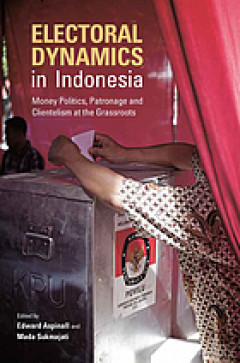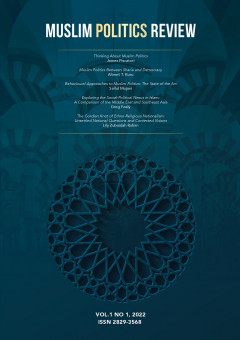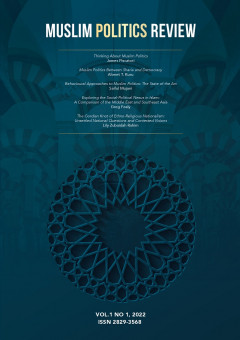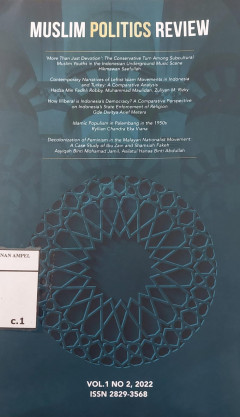Ditapis dengan

A country in despair : Indonesia between 1997 and 2000
8555
- Edisi
- -
- ISBN/ISSN
- -
- Deskripsi Fisik
- -
- Judul Seri
- -
- No. Panggil
- 320.959 803 9 Dij c

Electoral dynamics in Indonesia : money politics, patronage and clientelism a…
- Edisi
- -
- ISBN/ISSN
- 9789814722049
- Deskripsi Fisik
- xix, 433 hlm, 24 cm
- Judul Seri
- -
- No. Panggil
- T 324.959 804 Ele
- Edisi
- -
- ISBN/ISSN
- 9789814722049
- Deskripsi Fisik
- xix, 433 hlm, 24 cm
- Judul Seri
- -
- No. Panggil
- T 324.959 804 Ele
Politik
Dalam buku ini, Aristoteles mengkritik dengan tegas pemikiran politik Plato yang terlampau utopis dalam Republik. Berbeda dengan Plato, idealismenya dikonstruksi bukan dengan latar belakang yang murni atau puitik, melainkan dengan studi yang cermat dan simpatik atas fakta-fakta yang luas. Politik adalah panduan mendasar untuk legislator, seorang ahli yang dipanggil saat negara membutuhkan bantu…
- Edisi
- Cetakan pertama, Agustus 2020
- ISBN/ISSN
- 978-623-7290-90-2
- Deskripsi Fisik
- 396 halaman ; 20 cm
- Judul Seri
- -
- No. Panggil
- 320 Ari p

Muslim politics review
Muslim Politics Review is an international peer-reviewed journal published by the Faculty of Social Sciences of the Indonesian International Islamic University (UIII) that focuses on the multifaceted relationships between religion and political and socio-economic development of Muslim states and societies. The journal examines political dynamics within Muslim societies and their responses to gl…
- Edisi
- -
- ISBN/ISSN
- 2829-3568
- Deskripsi Fisik
- -
- Judul Seri
- -
- No. Panggil
- J 297.272 Mus

Exploring the social-political nexus in islam: a comparison of the Middle Eas…
One of the fulcrums of change in political Islam is the relationship between traditional patterns of Islamic politics, which focus upon the pursuit and wielding of formal power, particularly with the aim of enacting of shari’a law, and the more recent emergence of dynamic social spheres of Islamic activism, which emphasise values and moral order and operate with considerable autonomy from Isl…
- Edisi
- Muslim Politics Review, vol. 1, no. 1 Juni 2022
- ISBN/ISSN
- 2829-3568
- Deskripsi Fisik
- 18 hlm. 59-77; 26 cm.
- Judul Seri
- -
- No. Panggil
- J 297.272 Mus

Behavioural approaches to muslim politics: The state of the art
The behavioural approach to Muslim politics in academic literature is a recent development. The approach emerged only in the early twenty-first century, largely as most Muslim-majority nations have been autocracies constraining the freedom of speech required to study political attitudes and behaviour. Many behaviourally driven studies have examined dimensions of Islam as predictors of political…
- Edisi
- Muslim Politics Review, vol. 1, no. 1 Juni 2022
- ISBN/ISSN
- 2829-3568
- Deskripsi Fisik
- 16 hlm. 41-57; 26 cm.
- Judul Seri
- -
- No. Panggil
- J 297.272 Mus

Muslim politics between sharia and democracy
Out of 50 Muslim-majority countries around the world, only six are electoral democracies. This problem has multiple material and ideational causes. This essay focuses on one ideational factor: the dominant method of Islamic law. The essay explains how this method became dominant after the eleventh century and why it causes the incompatibility between sharia (Islamic law) and democracy. The essa…
- Edisi
- Muslim Politics Review, vol. 1, no. 1 Juni 2022
- ISBN/ISSN
- 2829-3568
- Deskripsi Fisik
- 16 hlm. 23-39; 26 cm.
- Judul Seri
- -
- No. Panggil
- J 297.272 Mus

Thinking about muslim politics
Vast public attention has been devoted to the politics of Muslim societies, much of it prompted – and distorted – by the rise of radical Islamism, and there has been a corresponding and voluminous academic literature on the subject. A central debate centres on whether ‘Islam’ is a formative factor or not and, if it is, how is it determining. A prevalent view is that Muslim politics st…
- Edisi
- Muslim Politics Review, vol. 1, no. 1 Juni 2022
- ISBN/ISSN
- 2829-3568
- Deskripsi Fisik
- 19 hlm. 3-21; 26 cm.
- Judul Seri
- -
- No. Panggil
- J 297.272 Mus

'More than just devotion ': The conservative turn among subcultural muslim yo…
Scholars of Indonesian politics and Islam use the phrase ‘conservative turn’ to explain the increasing religious influence in contemporary Indonesia’s social, political, and cultural life. Although their literature provides insightful explanations about this trend, scholars fail to include subcultural Muslim youths in their analyses. The term ‘subcultural youths’ in this context refer…
- Edisi
- Muslim Politics Review, vol. 1, no. 2 Des 2022
- ISBN/ISSN
- 2829-3568
- Deskripsi Fisik
- 35 hlm. 117-152; 26 cm.
- Judul Seri
- -
- No. Panggil
- J 297.272 Mus

Islamic populism in Palembang in the 1950s
This study discusses the emergence of Islamic populism in Palembang in the 1950s. In the official narratives of Indonesian history, the political turbulence in Palembang that occurred in the mid-1950s is often associated with a regional Army commander-led rebellion. This research instead finds that Islamic groups played a crucial role in developing the preliminary conditions before the military…
- Edisi
- Muslim Politics Review, vol. 1, no. 2 Des 2022
- ISBN/ISSN
- 2829-3568
- Deskripsi Fisik
- 17 hlm. 209-226; 26 cm.
- Judul Seri
- -
- No. Panggil
- J 297.272 Mus
 Karya Umum
Karya Umum  Filsafat
Filsafat  Agama
Agama  Ilmu-ilmu Sosial
Ilmu-ilmu Sosial  Bahasa
Bahasa  Ilmu-ilmu Murni
Ilmu-ilmu Murni  Ilmu-ilmu Terapan
Ilmu-ilmu Terapan  Kesenian, Hiburan, dan Olahraga
Kesenian, Hiburan, dan Olahraga  Kesusastraan
Kesusastraan  Geografi dan Sejarah
Geografi dan Sejarah